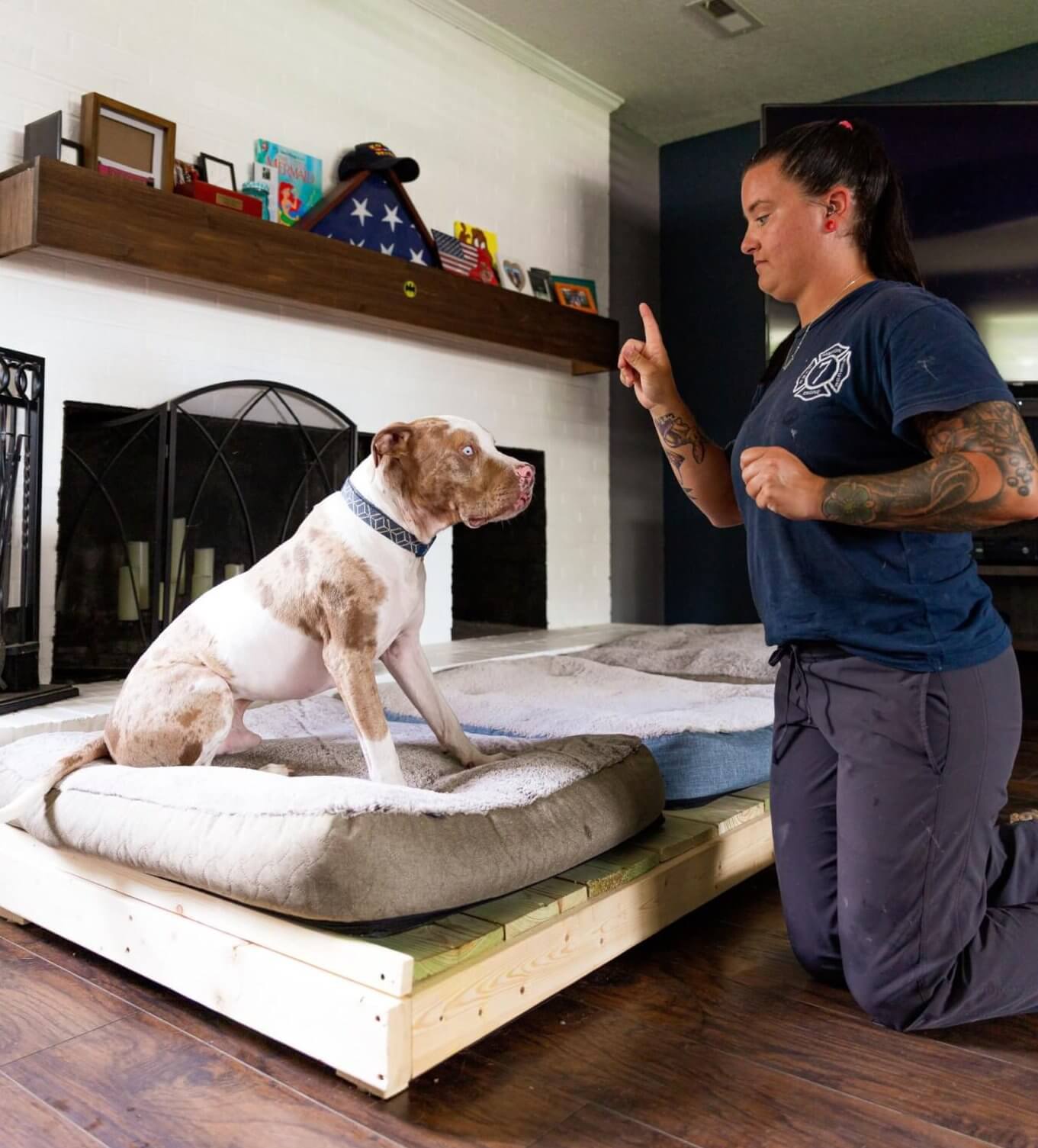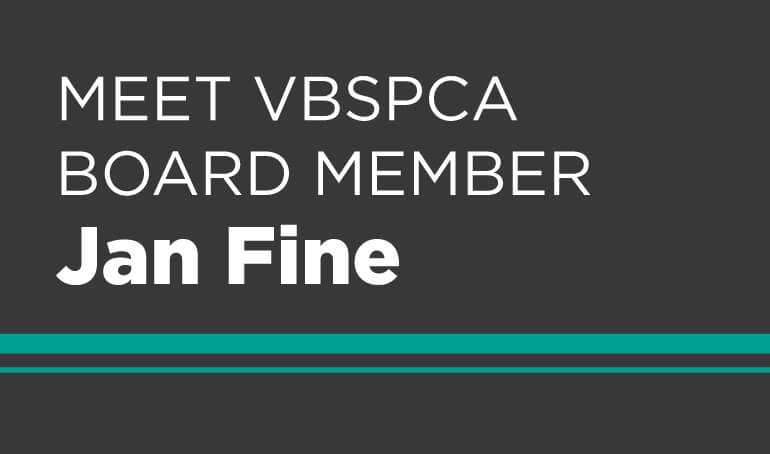
Jan Fine | In Service to the VBSPCA for 15+ Years
Jan Fine is a very familiar face at the Virginia Beach SPCA. For more than 15 years, she has served on the VBSPCA Board of Directors. When asked why she is so devoted to the organization, she simply says, “I have always loved animals and have been lucky to have them in my life.”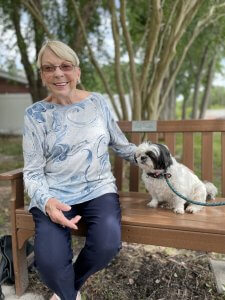 From a varied career history to a long track record in volunteering, Fine brings a wide array of experience and insight to her role on the board. She has done everything from editing reports to the Atomic Energy Commission for G.E. to owning her own gift shop. Fine’s volunteer work outside of the VBSPCA includes chairing the Boardwalk Art Show and Norfolk Academy’s Field Day as well as chairing galas for MOCA and the Virginia Aquarium.
From a varied career history to a long track record in volunteering, Fine brings a wide array of experience and insight to her role on the board. She has done everything from editing reports to the Atomic Energy Commission for G.E. to owning her own gift shop. Fine’s volunteer work outside of the VBSPCA includes chairing the Boardwalk Art Show and Norfolk Academy’s Field Day as well as chairing galas for MOCA and the Virginia Aquarium.
Fine is most passionate about adopting animals into loving homes. “Putting the right animal with the right family in a happy forever home is very special,” she says. “I also love that we can help to provide medical services in our community through our fantastic veterinary clinic.”
Fine’s passion for volunteer service is contagious. “The volunteer program is a wonderful way that people can get involved with the VBSPCA,” she suggests. “Attending fundraisers also helps to support animals at the shelter.”
Dedicated individuals like Fine ensure the VBSPCA can continue working towards its mission of eliminating animal suffering. We are grateful for everything she does to help our animals!
If you are interested in serving on the Virginia Beach SPCA Board of Directors, please email Emily.Peck@vbspca.com for more information.
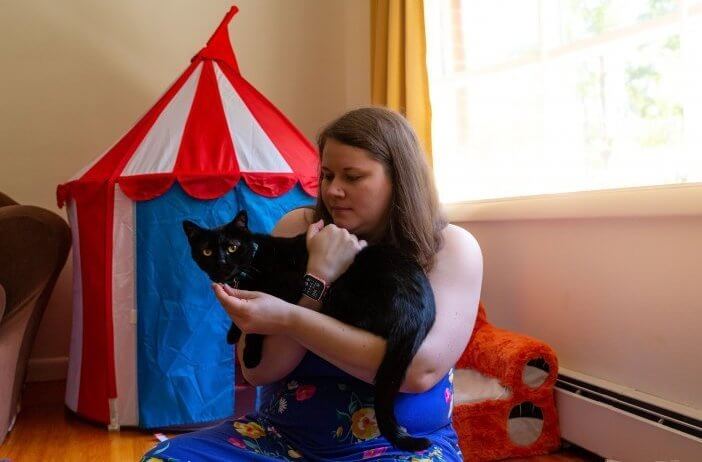
Happy Tails | Shadow
Every single animal that comes through our shelter has a story. Some are complex, many are sad, but all of them get better the minute they arrive at the Virginia Beach SPCA. Shadow arrived in November 2020 when his owner could no longer care for him and his sister. He was in need of dental surgery and had lost patches of hair. After the VBSPCA Clinic gave him the care he needed, he waited patiently for his forever home. After three months at the shelter, Shadow’s life changed when Katie and her family visited him in February 2021. Katie recently shared Shadow’s adoption story with us.
How did you know Shadow was the one for you?
 We were originally looking for a kitten. We have a rambunctious 2 year old boy and thought it would be easier for a kitten to get used to our loud household. After looking around at different shelters, we really couldn’t find any kittens or they would be snatched up so quickly we couldn’t get there in time. I finally started asking shelters if they had any family friendly cats or cats who tolerated kids. When I got to the VBSPCA, I asked and they pointed me immediately to Shadow, saying he was very affectionate with kids. I visited him and fell in love with him. All he wanted to do was rub and love on me. Even when I tried to play with him, he would just rub his head all over my hand. He is still the most affectionate cat I have ever met.
We were originally looking for a kitten. We have a rambunctious 2 year old boy and thought it would be easier for a kitten to get used to our loud household. After looking around at different shelters, we really couldn’t find any kittens or they would be snatched up so quickly we couldn’t get there in time. I finally started asking shelters if they had any family friendly cats or cats who tolerated kids. When I got to the VBSPCA, I asked and they pointed me immediately to Shadow, saying he was very affectionate with kids. I visited him and fell in love with him. All he wanted to do was rub and love on me. Even when I tried to play with him, he would just rub his head all over my hand. He is still the most affectionate cat I have ever met.
What sort of activities do you and Shadow do together?
We love to cuddle on the couch. He loves to sit on my chest and get chin scratches from my husband and I. My son loves pet Shadow and says, “Ahh Shadow! He’s a good cat.”
Does Shadow have any funny quirks or do you have any funny stories to share from your time together?
He is a beggar for food! I wasn’t expecting that from him. Whenever we go to the kitchen, he RUNS ahead of us, meowing, tail twitching and showing us the cabinet that we keep his food and treats in. When we get the bag of treats, he stretches on us and meows.
How has Shadow enriched your life so far?
He is the most affectionate cat we’ve ever known. He has a powerful purr and is the most patient, sweet cat I know. The minor inconvenience of litter and fur mean nothing in comparison with the love that he gives our little family.
Why do you think people should consider adopting a senior pet from a shelter?
Senior cats don’t need constant attention like kittens do. You have to constantly get energy out of a kitten, while a senior cat knows how to get energy out for themselves. For a while, I was looking into buying a purebred cat that is known for affection. But after my experience with the VBSPCA, now I know that all you have to do is ask the staff for the traits you are looking for in a pet. You save yourself money and your cat’s life by adopting from a shelter. You don’t need an expensive pet to get the love and affection you are looking for in a pet. We absolutely love our sweet cat and find ourselves lucky.
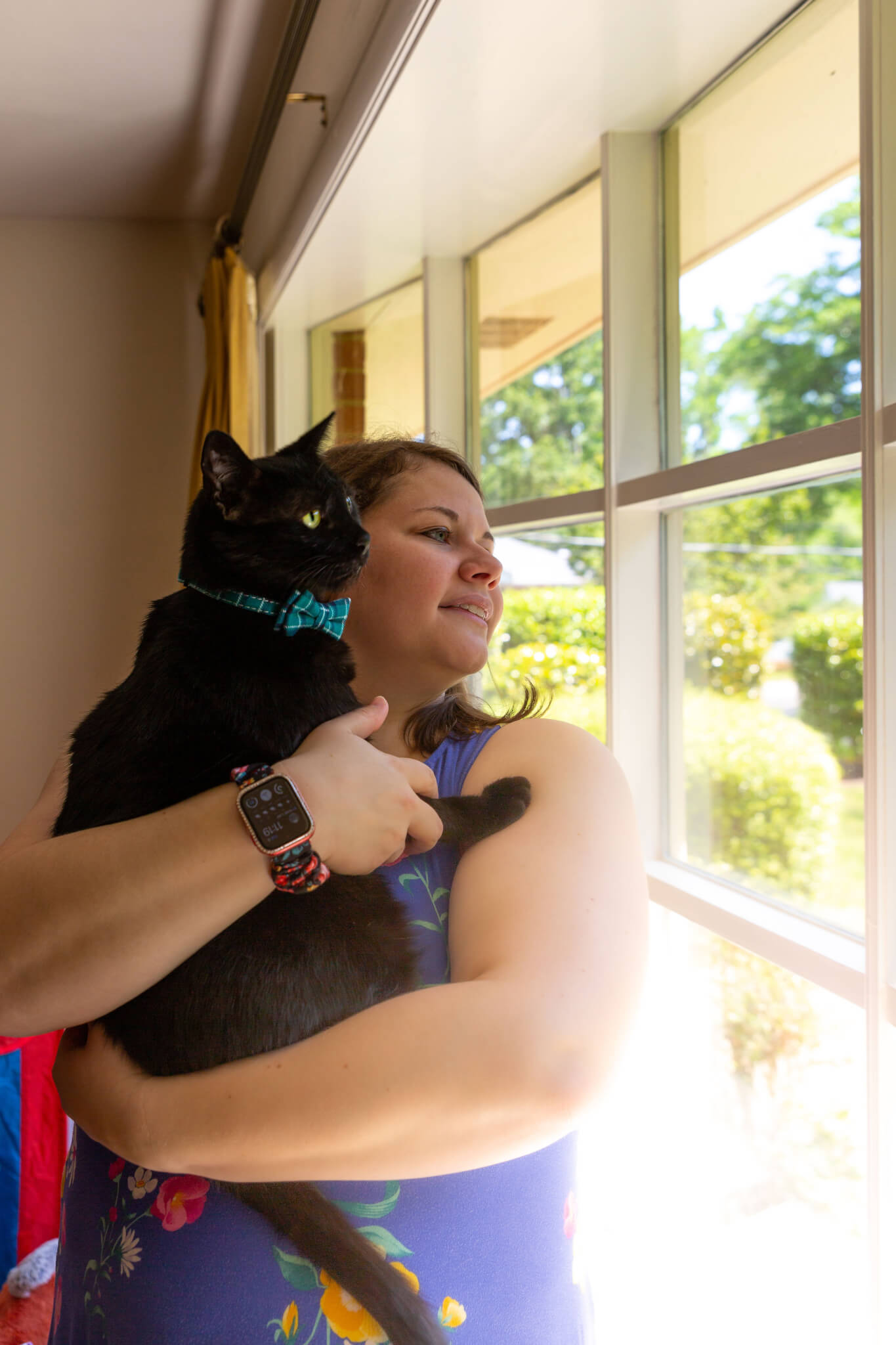
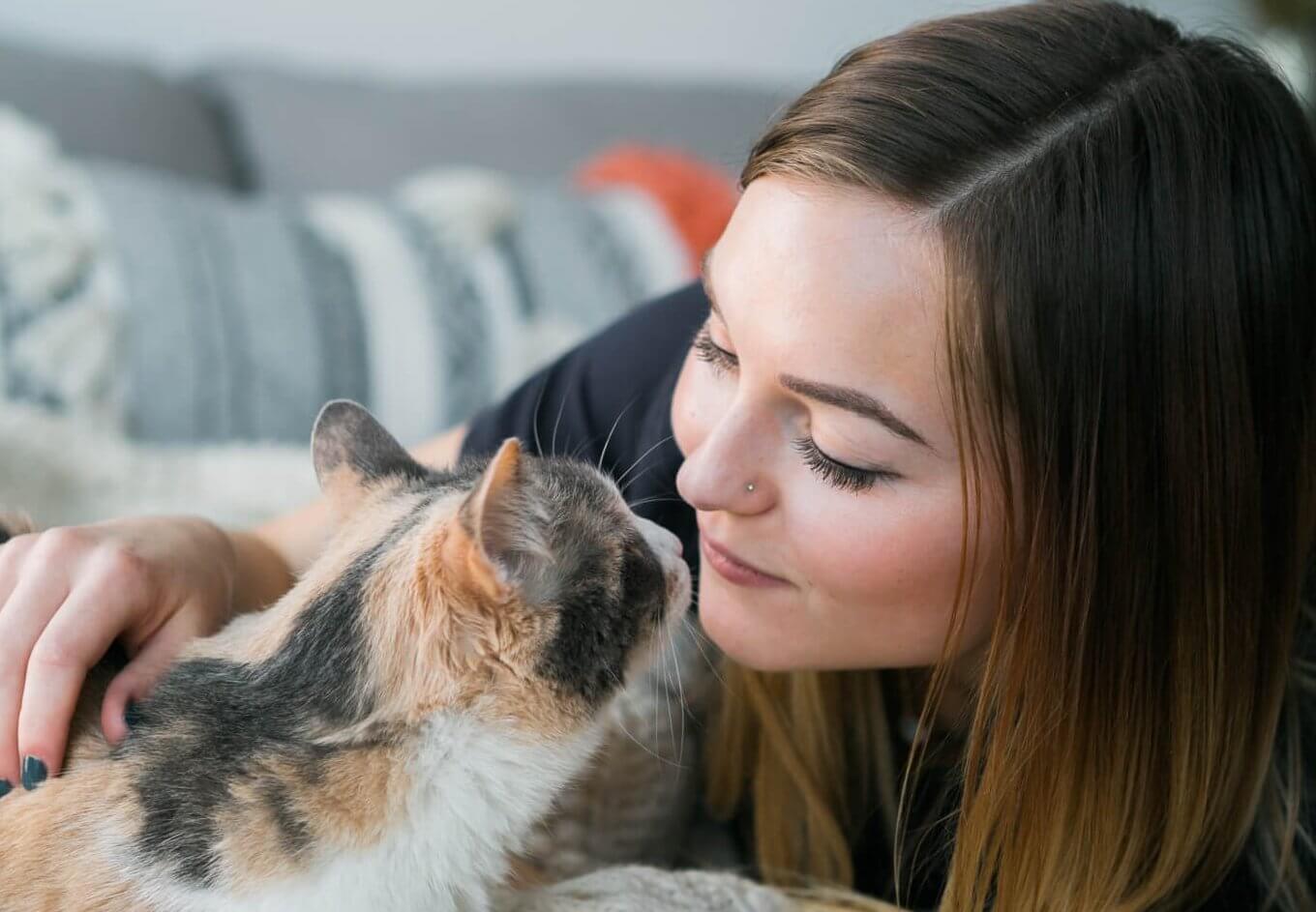
Pet Companionship | Health Benefits & Healing Power
Ask any pet owner, and they’ll tell you that their furry friend is an important part of their life. In fact, research has shown that having an animal companion is not only enjoyable – pets can actually help improve your mental health!
Pet ownership has been shown to reduce stress, anxiety, depression, and loneliness. That is very encouraging for the approximately 40 million adults in the United States who are affected by depression and anxiety. Here is a look at the science behind healing powers of the human-animal connection.
- Animal interactions boost the mood. Oxytocin and dopamine, the neurochemicals associated with positive feelings and bonding, have been observed in both dogs and people after enjoyable interactions like petting and playing.
- Pets reduce stress. Interacting with animals has been shown to decrease levels of cortisol (a stress-related hormone) and lower blood pressure.
- Having a pet can reduce feelings of loneliness. According to a survey by the Human Animal Bond Research Institute, 87% of respondents, both pet owners and non-owners, reported that interactions with an animal help combat feelings of loneliness. Additionally, dog owners can feel more connected to other people since walking your canine companion or taking him to the dog park can create chances for socialization, which can ease symptoms of depression.
- Walking a dog is especially helpful. Walking increases endorphins, which fight depression. Owning a dog can lead to a daily exercise routine that can help reduce stress levels, increase self-esteem, and the development of better sleep patterns.
While pet ownership is no substitute for professional medical treatment, it can provide a boost in your emotional health. And when you adopt an animal from the VBSPCA or any other animal shelter, you’re not the only one who benefits from the adoption – you’re providing a second chance for a homeless animal.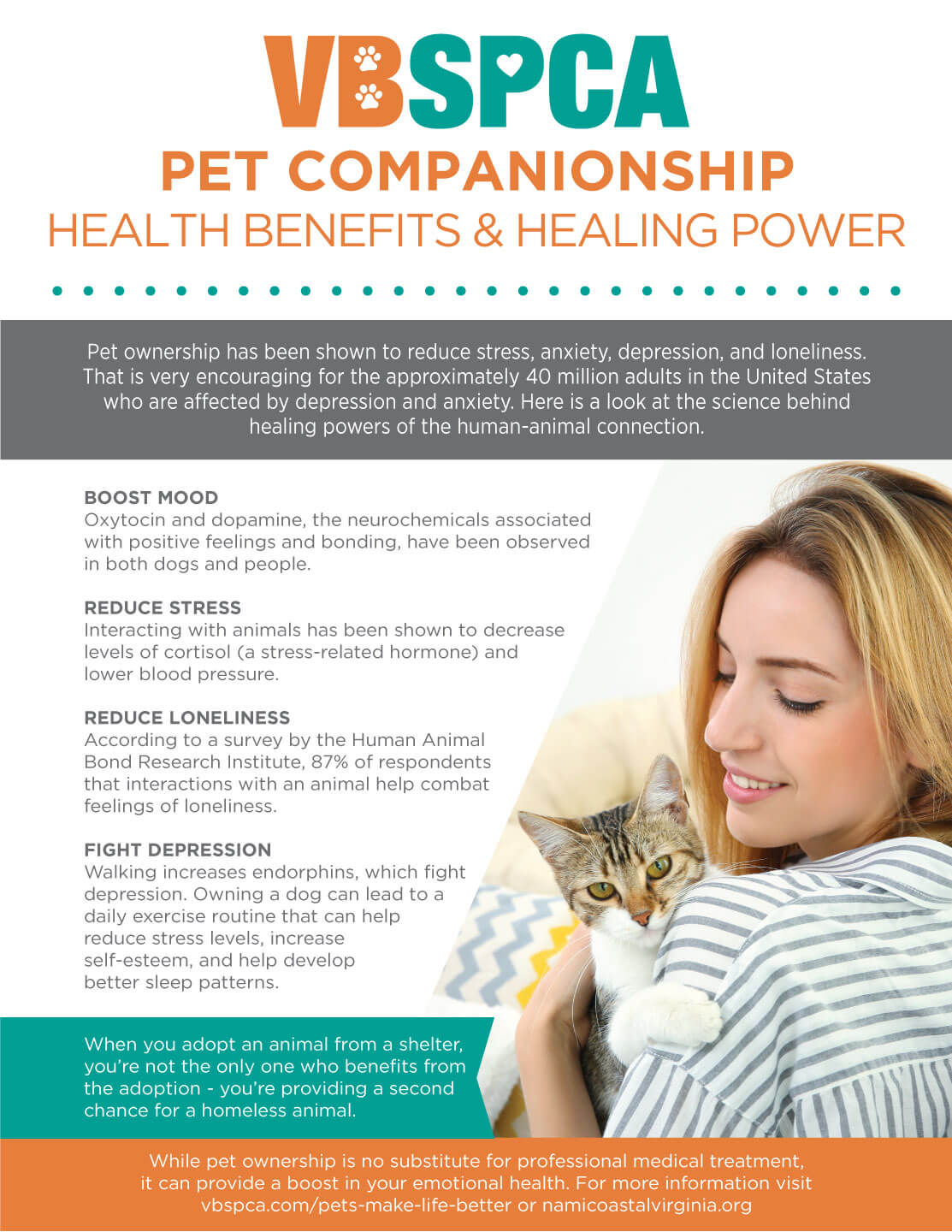

Happy Tails | Peabody
Every single animal that comes through our shelter has a story. Some are complex, many are sad, but all of them get better the minute they arrive at the Virginia Beach SPCA. Peabody came to the VBSPCA in October 2019 when his owner surrendered him. The three year old hound spent just over a month in our shelter before he met Christy. She noticed his hopeful eyes and quickly decided he was the dog for her. Christy says when she returned to pick him up, he ran to her and hasn’t left her side since then. We recently caught up with Christy, who shared just how special their bond has become.
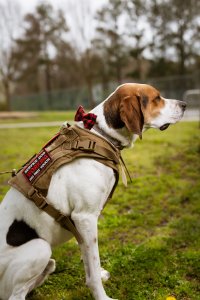 We heard that Peabody was training to become a service animal – can you share a little about that and his progress?
We heard that Peabody was training to become a service animal – can you share a little about that and his progress?
Peabody was evaluated by an organization called Train a Dog Save a Warrior (TADSAW). They work with military veterans and their families that have multiple types of disabilities. His training is completed, we are just waiting for the Public Access Test. We are very proud of how well and fast he learned his commands and job. He is a true blessing in my life.
How is Peabody doing in the home?
Peabody is doing amazing at home. He loves his sister, potbelly pig Bacon Bits, and loves going to the park. He is our funny, loving guy.
What sort of activities do you and Peabody do together?
Peabody and I do Instacart together (we grocery shop for other people). We also go for long walks, playdates at the dog park, we travel to Kentucky to visit friends, and we meditate together.
Does Peabody have any funny quirks?
One of Peabody’s quirks is he loves blankets – he will try to crawl under anything that looks like a blanket. He also will pout and throw a temper tantrum if I have a guest in the car and they sit in his seat.
How has Peabody enriched your life so far?
 Peabody has enriched my life by bringing a smile to our hearts, he lends us his ears when we just need to vent, and makes us laugh with his cute little prance he does when he is excited to go outside or to work. There are days I would be lost and still stuck on my couch if it wasn’t for him and him needing to be taken care of.
Peabody has enriched my life by bringing a smile to our hearts, he lends us his ears when we just need to vent, and makes us laugh with his cute little prance he does when he is excited to go outside or to work. There are days I would be lost and still stuck on my couch if it wasn’t for him and him needing to be taken care of.
Why do you think people should consider adopting a pet from a shelter?
Shelter dogs make great companions; they are forever grateful for the home and life that they receive. This also helps open doors and kennels for other pets to come in and find their happily ever after.
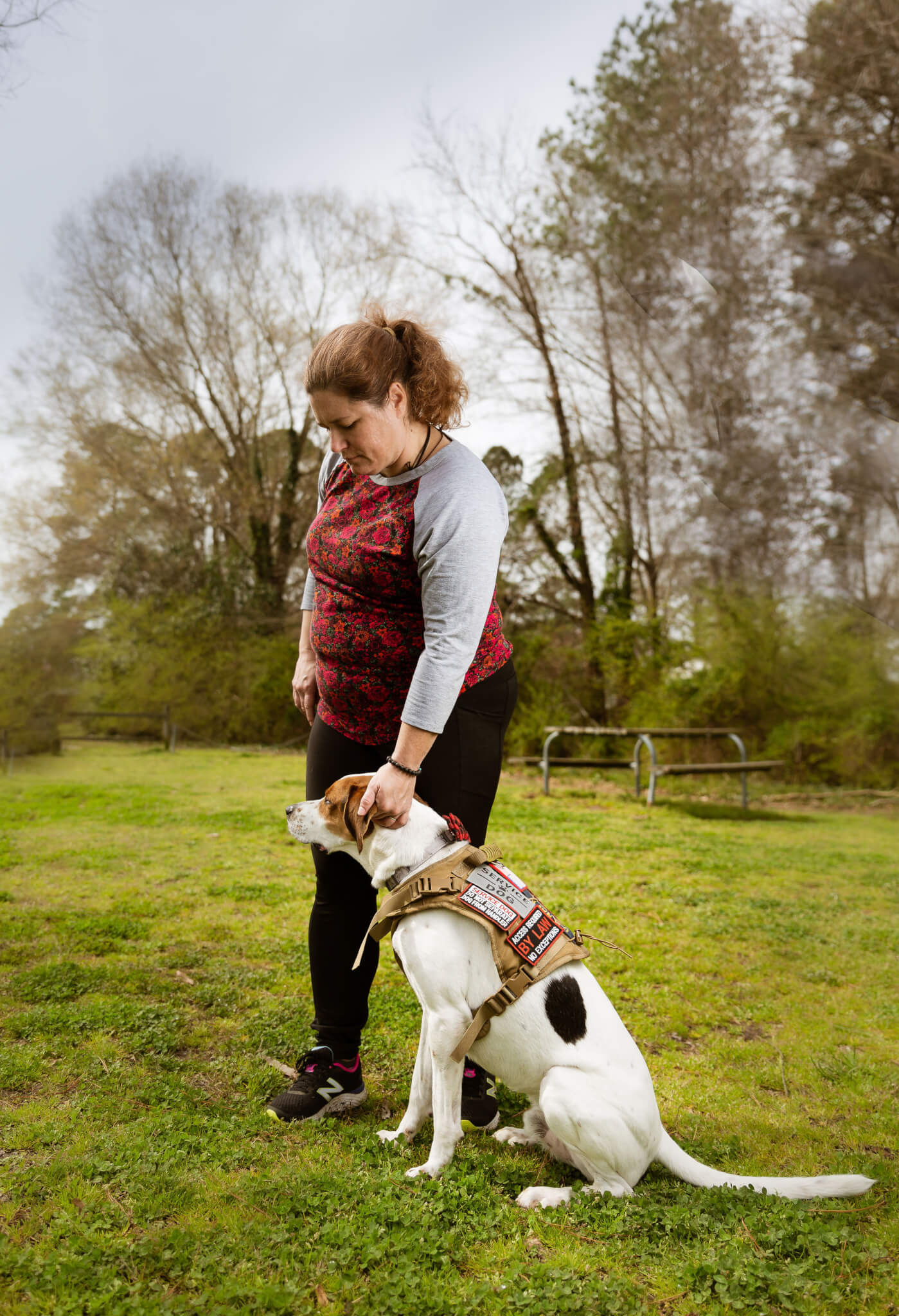

Dog Bite Prevention | Recognize The Warning Signs
According to the Centers for Disease Control and Prevention, more than 4.5 million people are bitten by dogs in the United States each year, and more than 800,000 seek medical attention for dog bites. Common reasons for a dog to bite include feeling scared, being startled or threatened, trying to protect something that is valuable to them (like food or toys), sickness, or injury. Dogs can also nip and bite during play.
All dogs can bite regardless of size, breed, or age if they are provoked. While there are simple things pet parents can do to prevent dog bites from happening, it is equally important to first understand what a dog is trying to tell you from their body language and behaviors.
What Dogs are Trying to Tell You
By paying close attention to a dog’s body language and behavior, you will be much less likely to be bitten. The ASPCA has listed the following signs of aggression, fear, or anxiety, which are feelings that can lead to a bite.
Signs of aggression include efforts to make the dog look bigger:
- Ears positioned upward and forward
- Raised fur on the back and/or tail
- Vertical tail, may be wagging very quickly
- Stiff, straight-legged stance
- Staring
- Growling, lunging, or barking
Signs of fear or anxiety include efforts to make the dog look smaller:
- Cowering and/or lowering of the head
- Repeated lip licking
- Tucked tail
- Flattened ears
- Yawning
- Avoiding eye contact
- Remaining very still
- Growling or snarling
If you encounter any of these signs, it is best to give the dog some space.
What You Can Do to Prevent Dog Bites
Aside from reading a dog’s body language, there are things you can do to reduce the chance of the dog biting you or someone else.
- Socialize your dog. By introducing your dog to other animals and people, you will help them feel more comfortable overall. Familiarizing your dog with everyday situations will make them less likely to become fearful and bite. However, you should let your pet go at their own pace. Don’t force them to interact with other people and animals when they are uncomfortable.
- Spay or neuter your dog. Studies have shown that altering your pet can help reduce their likelihood of biting.
- Know when to leave a dog alone. There are several situations that can make a dog more likely to bite. Those include when he is eating, sleeping, sick, injured, or positioned on the other side of a fence from you. You should also never approach a dog you don’t know without permission from their owner or any female dog who is with her puppies.
- Always supervise children when they are around a dog. Children are most likely to be the victim of dog bites, so do not leave them unattended with a pet. You can find more tips for child and pet safety here.
If you notice your dog has the tendency to be aggressive, fearful, or anxious, consider getting help from a certified trainer. You can find our list of recommended trainers here.
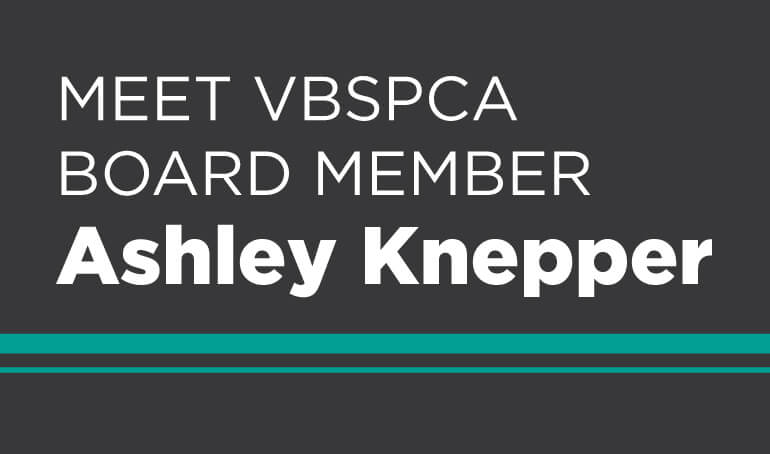
Ashley Knepper | In Service to the VBSPCA since 2019
Ashley Knepper first joined the VBSPCA Board of Directors in October 2019. “I was drawn to join the VBSPCA for three primary reasons,” Knepper says. “My love for animals, [CEO] Derby Brackett’s leadership style, and how actively I am able to contribute to the mission in areas where I am most qualified and passionate.”
 As an experienced marketing expert, Knepper provides guidance to assist in spreading the VBSPCA’s mission across Hampton Roads. She is co-founder and president of Reed & Associates Marketing, Inc., where she spearheads the planning and implementation of effective media strategies and oversees creative efforts for their clients and brand. Philanthropy is so ingrained in Knepper that her leadership led to Reed & Associates Marketing being named a Corporate VOLUNTEER Excellence Award honoree by VOLUNTEER Hampton Roads in 2014.
As an experienced marketing expert, Knepper provides guidance to assist in spreading the VBSPCA’s mission across Hampton Roads. She is co-founder and president of Reed & Associates Marketing, Inc., where she spearheads the planning and implementation of effective media strategies and oversees creative efforts for their clients and brand. Philanthropy is so ingrained in Knepper that her leadership led to Reed & Associates Marketing being named a Corporate VOLUNTEER Excellence Award honoree by VOLUNTEER Hampton Roads in 2014.
Knepper is deeply committed to all aspects of the VBSPCA mission. “Obviously the animals themselves are what motivate everyone to contribute but a part of our program that I have found most interesting is the educational piece,” says Knepper. “I believe a lot of good comes from our commitment to educating the community about animal welfare and homelessness.”
In addition to educating our community, Knepper encourages others to get involved to help homeless animals. “From volunteering with the animals at the shelter to participating in events around the community, there are so many ways to get involved with the VBSPCA. Sign up for our weekly Pawprint newsletter to stay connected and in the know!”
Without the support of individuals like Knepper, the VBSPCA could not sustain our mission to eliminate animal suffering. We are so appreciative of everything she does to help our furry friends!
If you are interested in serving on the Virginia Beach SPCA Board of Directors, please email Emily.Peck@vbspca.com for more information.
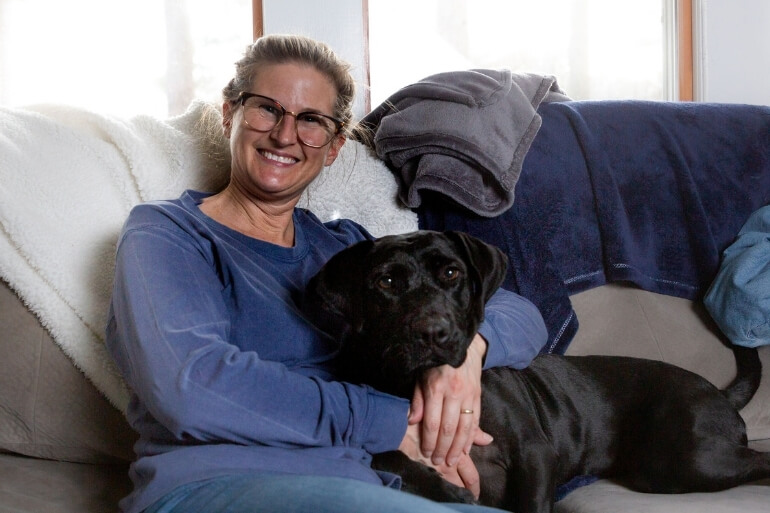
Happy Tails | Bella
Every single animal that comes through our shelter has a story. Some are complex, many are sad, but all of them get better the minute they arrive at the Virginia Beach SPCA. Bella came to the VBSPCA in July 2020 through our transfer partners in St. Charles Parrish, Louisiana. When they found her, she was missing a paw and heartworm positive. She needed serious medical care before she could find a home.
Once Bella arrived at the VBSPCA, our veterinarians determined that she would need to have her rear right leg amputated. After recovering from her heartworm treatment and leg surgery in a foster home, Bella found her forever home with Tricia in December 2020. We recently checked in with Tricia to see how Bella is doing now.
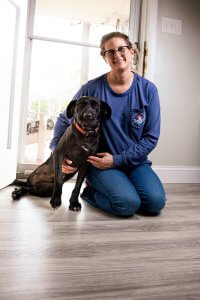 How did you find Bella?
How did you find Bella?
I found Bella on the VBSPCA website. I read the description and had to meet her. I wasn’t really planning on adopting another dog but something told me that she was going to be hard to resist, and I was right.
How is Bella doing in the home?
Bella is doing awesome in the home, fitting in well with the routine and her two dog sisters, Peanut and Penny. Penny is also a shelter dog from the Elizabeth City SPCA. They are both younger than Bella, but she has equal – if not more – energy and enthusiasm.
What sort of activities do you and Bella do together?
Bella enjoys running outside in the backyard, digging for grubs, chasing her sisters, and has also learned that naps are great! She enjoys eating whipped cream from the can and knows when someone is in the kitchen, she’s bound to get a treat.
Does Bella have any funny quirks?
Bella does not like to get in her kennel for bedtime. She will run on the couch and curl up into a ball, it’s the cutest thing.
Why do you think people should consider adopting a pet from a shelter?
I think all people should seriously think about adopting a shelter dog. They can bring so much joy, companionship, and entertainment. I’m always laughing at my crazy rescue dogs. I whisper in their ears how much I love them and how good they are. I can’t imagine what I would be doing without these pups.
What would you tell someone who is considering adopting an animal with special needs?
I would encourage anyone who may be looking to adopt a dog with special needs to go for it. It’s such a blessing and you will feel great with all the love that dog will give back to you. I look into Bella’s eyes and I see how grateful she is. She gives me lots of kisses daily to thank me for giving a three-legged dog a chance; a chance to prove that she’s just as awesome as any four-legged dog.
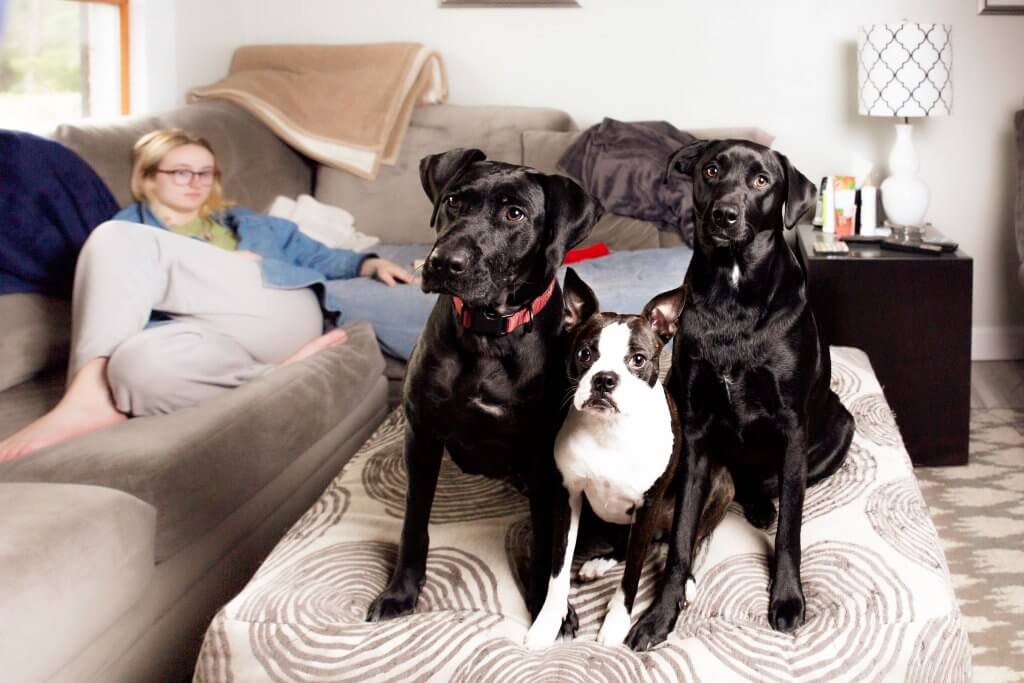
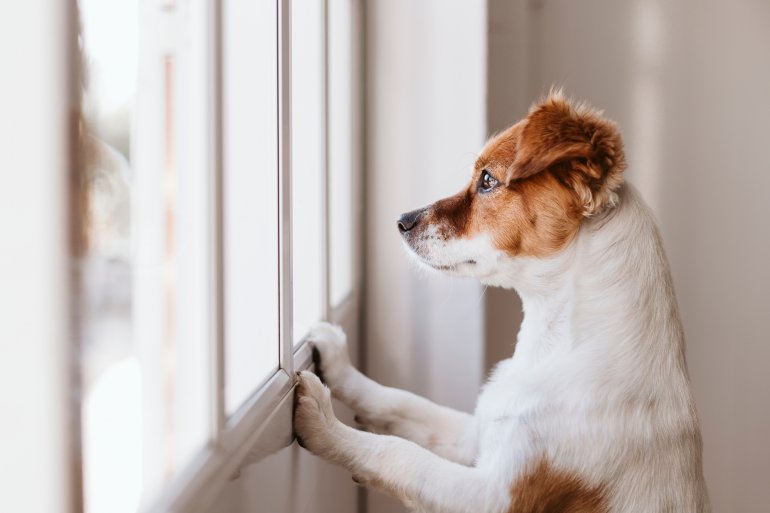
Separation Anxiety | How To Help Pets Cope
While the COVID-19 pandemic brought a multitude of challenges for humans, many pets benefitted from the changes to all of our lives. With the rise of teleworking, virtual learning, and a lack of social engagements and travel plans, animals had more time than ever with their pet parents.
Many people have returned to the office and started socializing more often. However, our return to “normalcy” can be hard for many dogs and cats who may experience separation anxiety. But with some planning and training, you can help your pets cope with these changes.
What is Separation Anxiety?
Separation anxiety is when an animal becomes stressed or upset when not in the presence of his pet parent(s). While this condition is more often associated with dogs, cats can also experience separation anxiety. The signs of separation anxiety can range from mild to severe and even dangerous. Signs of separation anxiety include:
- Going to the bathroom in the house/outside the litterbox
- Barking, howling, meowing, or crying
- Chewing, digging, destroying things
- Pacing
- Excessive grooming
- Attempting to escape home or area in which the pet is confined by chewing or digging at doors/windows
Separation anxiety can be triggered by changes in routine, moving to a new residence, being abandoned or surrendered for adoption, or changes in household membership due to life events such as divorce, the death of a family member, or an adult child moving out of the home.
Preventing Problems
Even if your pet has not experienced separation anxiety in the past, it is important to prepare them for upcoming changes like returning to the office or leaving for vacation. Here are a few ideas to prevent stress in your pets:
- Break up your routine. Most people are creatures of habit. Pay close attention to what you normally do before you leave the house and try not to follow the exact same sequence every time. For example, you usually pack your lunch, put on your socks and shoes, and then gather your purse/wallet/coat right before walking out the door. Try doing those things in a different order, or taking breaks in between each action so your pet is less likely to anticipate your next move. You can also do things like picking up your keys on your day off and going to the door but not actually leaving. Your pet will learn that keys don’t always mean they’re about to be alone.
- Gradually increase the amount of time you’re away. If possible, start leaving your pet for short periods of time now. Run an errand or take a walk around the block without your pet so he can get used to you not being with him. This will avoid an abrupt shift from being with your pet 24/7 to being gone for 9-10 hours at one time.
- Keep arrivals and departures calm. While there is nothing like a happy welcome from your pet after a long day, don’t make a big deal of your comings and goings. Extended goodbyes and very excited homecomings only increase separation anxiety.
- Keep your pet busy. Providing things for your pet to do both when you are home and when you are gone is very important. Go for walks and play with your pet to help him get some of his energy out when you are together. Provide mentally stimulating toys like puzzle feeders when your pet will be alone. Some pets even enjoy having music or the television on while you are gone.
Seek Solutions
Some pets may still experience separation anxiety despite your best efforts. While some of their behaviors due to their anxiety may frustrate you, it is important to seek solutions instead of punishing them. Consult with your veterinarian if you feel you need help. There are medications and supplements that can help severe cases of separation anxiety. You can also reach out to a qualified trainer who can provide expert advice specific to your pet.
Remember, your pet loves you and is happiest when he can spend time with you. By setting him up for success and helping him to realize you will always return home, you can help your pet become confident and happy even when you are not around.
Need more information? Click here for additional information on separation anxiety from the ASPCA.
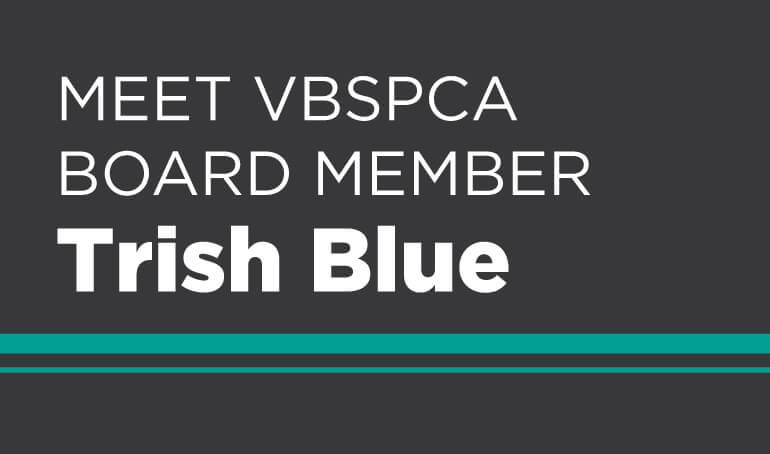
Trish Blue | In Service to the VBSPCA for 15+ Years
For more than 15 years, Trish Blue has served on the VBSPCA Board of Directors. “I wanted to support an organization with a mission that I was passionate about,” she says.
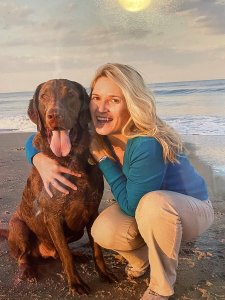 With over 20 years experience as a CPA, Blue provides financial guidance to the VBSPCA. She is currently a director of assurance services for Cherry Bekaert in Virginia Beach, where she focuses on audits for real estate entities, nonprofit organizations, and employee benefit plans. She lives in Virginia Beach with her Chesapeake Bay Retriever.
With over 20 years experience as a CPA, Blue provides financial guidance to the VBSPCA. She is currently a director of assurance services for Cherry Bekaert in Virginia Beach, where she focuses on audits for real estate entities, nonprofit organizations, and employee benefit plans. She lives in Virginia Beach with her Chesapeake Bay Retriever.
Blue is most passionate about finding homes for shelter animals and educating the community on how to be responsible pet parents. However, she encourages everyone to get involved in the VBSPCA’s mission in any way they can. Her advice: “Find the one area [of the mission] you are most passionate about to become involved in, whether that be volunteering time in our kennels, attending our fundraising events, joining the board, or, if your time is limited, donate!”
The VBSPCA cannot work towards eliminating animal suffering without the support of dedicated community members like Blue. We truly appreciate all she does for our animals!
If you are interested in serving on the Virginia Beach SPCA Board of Directors, please email Derby.Brackett@vbspca.com for more information.

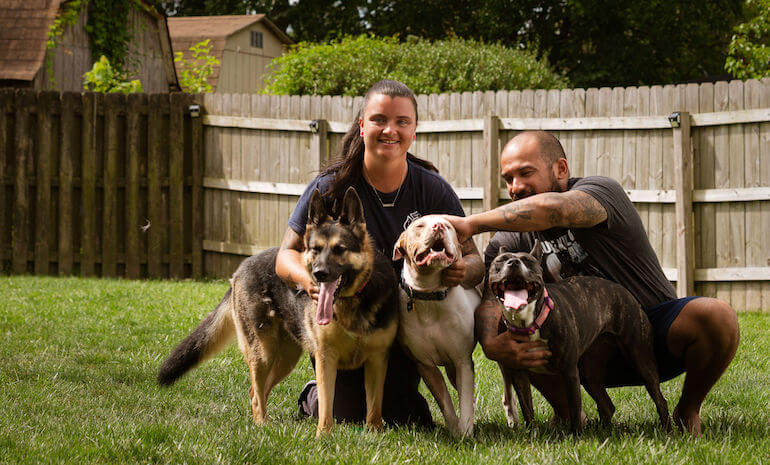
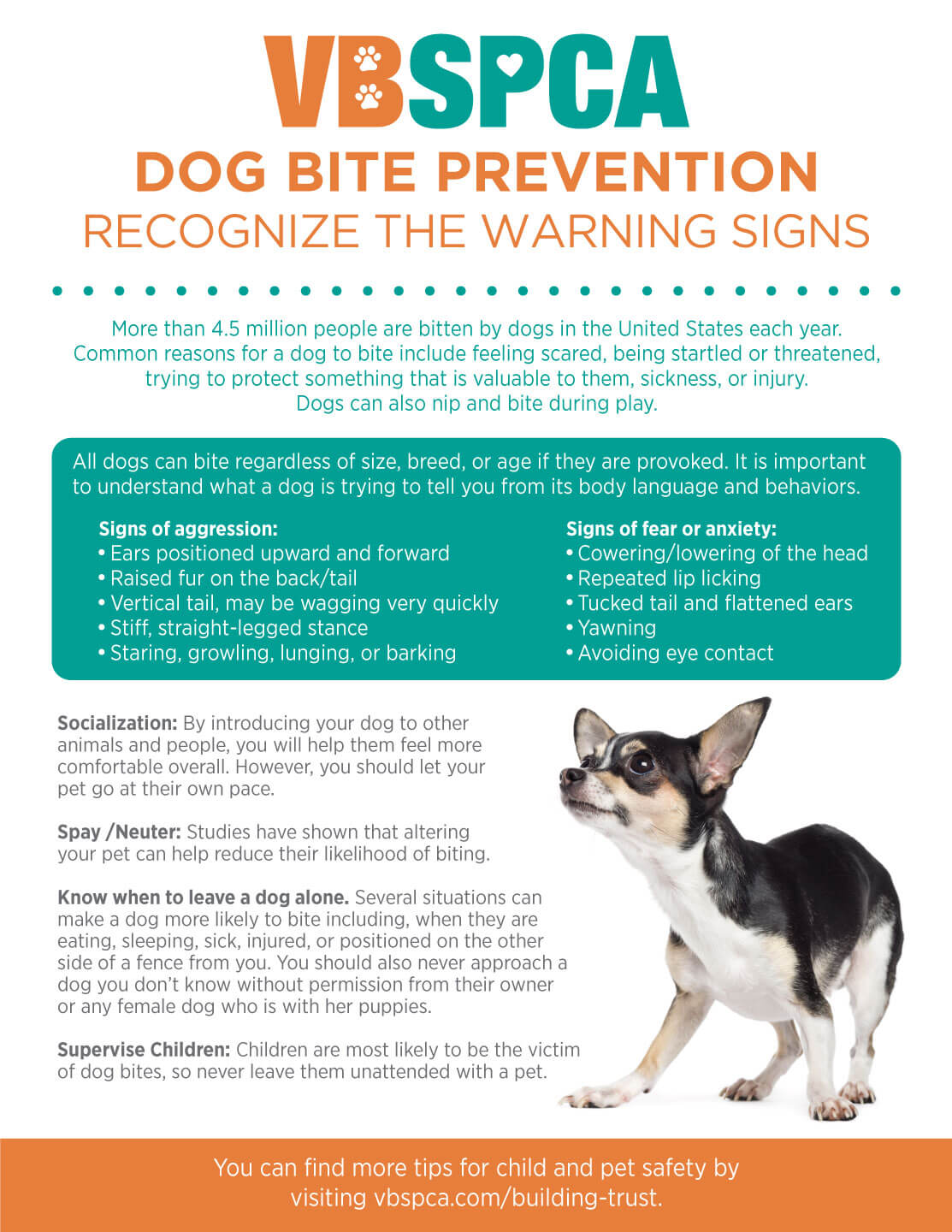
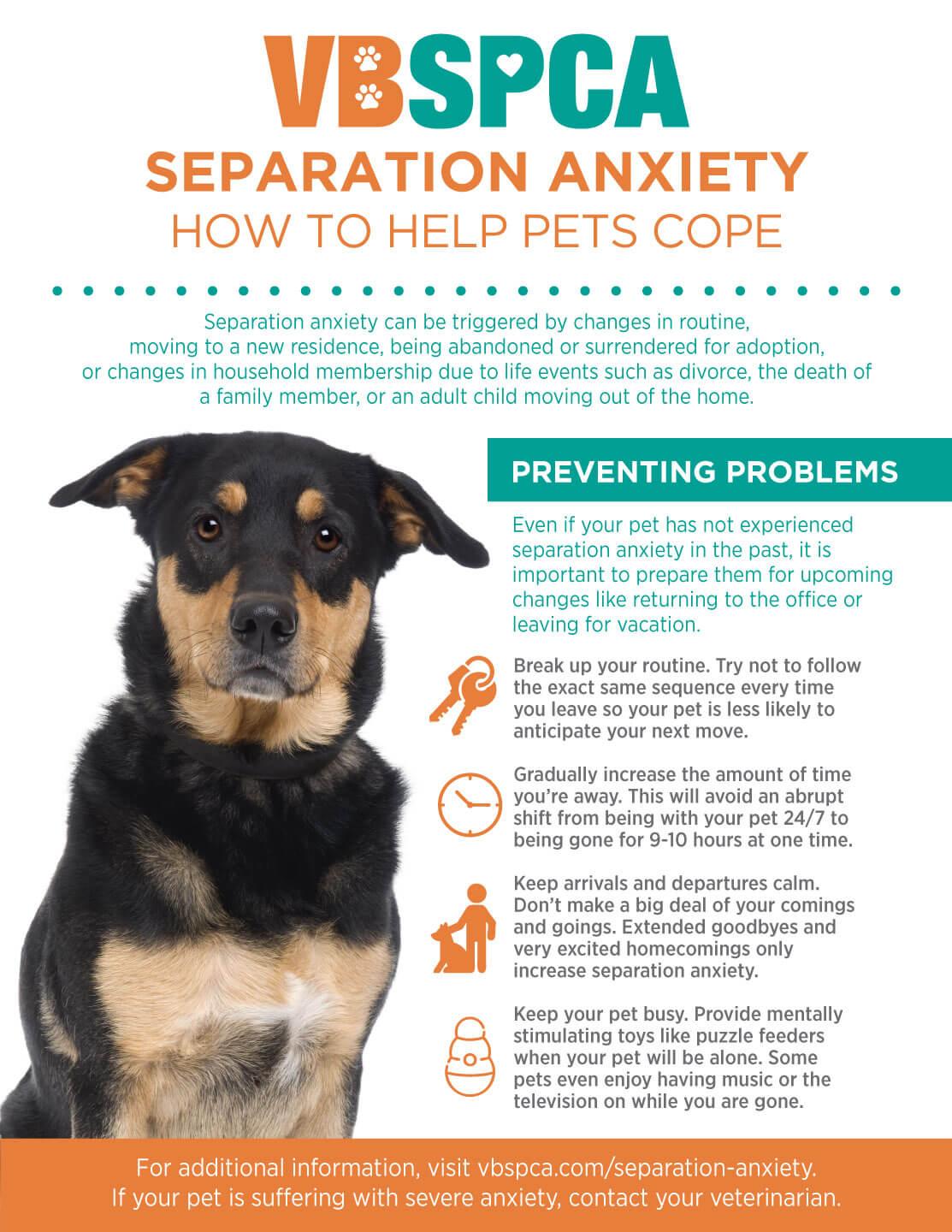



















Posted: June 29, 2021 by vbspcaadmin
Happy Tails | Tonka
Every single animal that comes through our shelter has a story. Some are complex, many are sad, but all of them get better the minute they arrive at the Virginia Beach SPCA. Tonka arrived in December 2020 when he was transferred from an animal shelter in North Carolina. The three year old Catahoula Leopard Dog mix needed a special home since he is deaf and very high energy. Additionally, Tonka needed to go through heartworm treatment with the help of the VBSPCA Clinic. After two months of waiting, Tonka’s perfect match appeared and he was adopted in February 2021. We recently caught up with his owner Katlin to see how Tonka has settled into his forever home.
How did you find Tonka?
How is Tonka doing in the home?
Tonka is doing amazing at home! Of course it was a process in the beginning but it was well worth it. He is gaining some much needed weight, getting all the proper shots and exams for his heartworms, and, of course, having the much needed feeling of being at home with family.
Where do I even begin with his activities? It all starts with him waking us up for his morning feeding at a proper 7am. After that he takes his usual one hour nap. Then it’s all playing fetch and tag with the dogs in the backyard. His favorite is letting the other dogs get the toy, but then trying to retrieve it out of their mouth. Afterwards they come in for a nice tasty treat.
Does Tonka have any funny quirks?
Tonka’s famous and funniest quirk is looking into the mirror and always thinking it’s another dog. No matter how many times he passes the SAME mirror, it’s always another dog. He will spend hours just growling and staring into the mirror. At night we always have to drape a sheet over it for him to lay down.
How has Tonka enriched your life so far?
Tonka has not only enriched Adrian and I with being happy, but both of our dogs with giving them an added brother!
Why do you think people should consider adopting a special needs pet?
People should consider adopting a special needs dog because it builds a more unique bond. It’s easy to adopt a dog who can hear you and train, but to take the time and work hard training one who is deaf – it’s a feeling I can’t even begin to describe. It’s that moment that you see in the dog that everything clicks: you literally cry of happiness.
